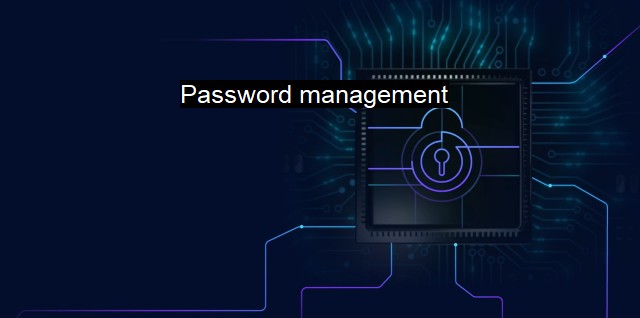What is Password management?
The Crucial Significance of Password Management in Ensuring Cybersecurity: Best Practices for Data Protection and Risk Mitigation
Password management is a critical component in the world of cybersecurity and antivirus protection. It involves creating complex passwords, storing them securely, and regularly changing them to preserve the security of an individual's or organization's sensitive data, private information, and other forms of credentials. Password management is often overlooked but plays a vital role in guarding online and computer systems against successful cyberattacks.Cybersecurity is an ever-evolving industry that primarily deals with protecting networks, systems, and data from cyber threats. These threats can invade the system and cause damage, or cybercriminals could misuse individuals' or organizations' critical data. Effective password management is one of the most reliable lines of defense to ensure robust cybersecurity. Long, complex passwords that are difficult to guess and regularly changed have proven to be an effective deterrent against hacking.
In the context of antivirus applications, password management enables secure usage and prompts users to create passwords that are susceptible to antivirus measures. Most antivirus software provides an added layer of password protection; businesses and individuals are enabled to keep their information safer by imposing restraints on who can access specific pieces of information. Antivirus software often offers integrated password managers that further protect user data from being exploited.
Password managers are another crucial element in efficient password management. These are tools that remember all of your passwords for you. Once you store a password in a password manager, it can fill in your information for you the next time you visit that site. These tools allow individuals to create a unique and complex password for each account without worrying about remembering all of them. Importantly, password managers typically use robust encryption to make sure your passwords are as secure as possible.
On a technical level, password management is more complex than just generating and storing passwords securely. It includes practices such as password hashing and salting to prevent adversaries from quickly figuring out passwords. These additional security practices add further obstacles for hackers attempting to gain unauthorized access to systems.
It's understood that password management stands as a basic but powerful weapon against adversaries in cyberspace. Accordingly, it constitutes a critical component of most online security strategies. It is vital in different types and forms of digital platforms—from email platforms, cloud-based applications, and operating systems, to mobile applications, and more —requiring passwords.
It is an integral aspect of protecting against different kinds of malware. Cybercriminals often exploit weak password management practices to install malicious software that can lead to more serious security breaches. In many cases, antivirus software can detect these malware-signatures before they cause any harm, particularly if the user maintains robust password management protocols.
In an era of interconnectivity where the repercussions of compromised personal or business information can prove disastrous, efficient password management is indispensable. Developing a strong password system can help potentiate security measures, tailoring them to specific threats and developing an overall resilient network.
Password management contributes significantly to enhancing cybersecurity and acts as a strong barrier against potential hackers and malicious cybercriminals. It shares close ties with antivirus aspects and presents itself as an added level of security along with the antivirus applications. Online businesses and individuals need to comprehend the niche specifics of password management to leverage their network's absolute potential and protect their sensitive data and essential services online. The witness of rising cyber threats prompts us to strengthen our strategies and tactics related to password management, thereby invigorating the overall cybersecurity protection strategies.

Password management FAQs
What is password management?
Password management is the practice of properly storing and securing passwords for different accounts and applications. It involves creating complex and unique passwords, regularly changing them, and using a reliable password manager to keep track of them.Why is password management important in cybersecurity?
Password management is crucial in cybersecurity because weak, reused, or compromised passwords are a primary target for hackers. Proper password management can prevent unauthorized access to personal or sensitive information, protect against identity theft, and prevent cyber attacks.What is a password manager?
A password manager is a software tool that securely stores and manages passwords for different accounts and applications. It generates strong and unique passwords, stores them in an encrypted database, and requires a single master password for access. Password managers also often offer features such as secure sharing and automatic password changes.How do I choose a reliable password manager?
When choosing a password manager, make sure it has end-to-end encryption, multi-factor authentication, and strong password generation capabilities. Look for a reputable provider with positive reviews and a proven track record of security. It is also important to consider the user interface, compatibility with different platforms, and cost.| | A | | | B | | | C | | | D | | | E | | | F | | | G | | | H | | | I | | | J | | | K | | | L | | | M | |
| | N | | | O | | | P | | | Q | | | R | | | S | | | T | | | U | | | V | | | W | | | X | | | Y | | | Z | |
| | 1 | | | 2 | | | 3 | | | 4 | | | 7 | | | 8 | | |||||||